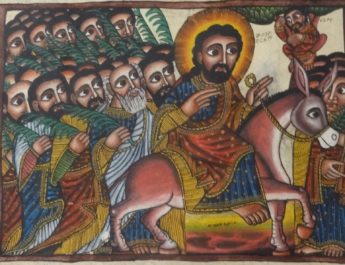Psalm 104:14-16
Narrative Lectionary 421
14 You cause the grassA to growB for the cattle,C
and plantsD for peopleE to use,F
A “grass” = chatsir. Perhaps from the same as chatsir (village, settlement); from chatser (enclosure or court – a yard that is fenced in. It could also be a village or hamlet that is walled in); from chatsar (to blow a trumpet, trumpeter, to surround); from chatsotsrah (trumpet). This is grass, plant, hay, leeks.
B “grow” = tsamach. This is to sprout, grow, or spring up – literal or figurative.
C “cattle” = behemah. This is animal or cattle. It is often used of large quadrupeds.
D “plants” = eseb. Root may mean to be green or to glisten. This is grass or some other tender shoot.
E “people” = adam. Perhaps from adam (to be red, make ruddy); related to adamah (ground, dirt, earth). This is man, humankind, also Adam’s name. It refers to a human individual or humanity.
F “use” = abodah. From abad (to work, serve, compel; any kind of work; used causatively, can mean to enslave or keep in bondage). This is labor, service, bondage, job, servitude, worker. It can refer to any kind of work.
to bring forthG foodH from the earth,I
15 and wineJ to gladdenK the humanL heart,M
G “bring forth” = yatsa. This is to go or come out, bring forth, appear. It is to go out in a literal or figurative sense.
H “food” = lechem. From lacham (to eat, feed on). This is bread, food, loaf. It can refer to food more generally for people or for animals.
I “earth” = erets. Root may mean to be firm. This is earth, ground, field land, or country.
J “wine” = yayin. Root may mean to effervesce, referring to the fermentation process. This is wine, grape, or banquet. It can imply intoxication.
K “gladden” = samach. This is to rejoice or be glad. Properly, it is to brighten up in a literal or figurative sense.
L “human” = enosh. From anash (to be weak, sick, or frail). This is human, humankind, another. It is mortal.
M “heart” = lebab. May be related to labab (to encourage; properly, to be encased as with fat; used in a good sense, this means to transport someone with love; used in a bad sense, it can mean to dull one’s senses). This is the heart, courage, one’s inner self, the mind, or the will. Heart is only used in a figurative sense in the Old and New Testaments.
oilN to make the faceO shine,P
and breadQ to strengthenR the human heart.
N “oil” = shemen. From shamen (to shine, which implies being oily, growing fat). This is fat, oil, grease, olive oil – often with perfume. Used figuratively for fertile, lavish, rich.
O “face” = paneh. From panah (to turn, face, appear). This is face in a literal or figurative sense. It could be face, presence, anger, respect. It can also be used of God to indicate divine favor or presence.
P “make…shine” = tsahal. 9x in OT. This is to cry or shout – including an animal cry or neigh. It can also mean to gleam, rejoice, be glad.
Q “bread” = lechem. Same as “food” in v14. See note H above.
R “strengthen” = saad. 12x in OT. This is to support – usually used in a figurative sense. So it is sustain, hold, refresh, comfort, establish.
16 The treesS of the LordT are watered abundantly,U
the cedarsV of LebanonW that he planted.X
S “trees” = ets. Perhaps from atsah (to shut, fasten, firm up, to close one’s eyes). This is tree or other things related to trees like wood, sticks, or stalks. It can also refer to wood products like a plank or staff or gallows. Additionally, this can refer to a carpenter.
T “Lord” = YHVH. From havah (to be, become) or hayah (to come to pass, become, be). This is the name of the God of Israel, the self-existent and eternal one, the tetragrammaton. This pronunciation has been lost to time so “Lord” is generally used in its place.
U “watered abundantly” = saba. To be satisfied or full in a literal or figurative sense. Also, to have plenty of.
V “cedars” = erez. Perhaps from araz (made from cedar; to be firm, strong). This is cedar or a cedar tree as strong.
W “Lebanon” = Lebanon. Perhaps related to “heart” in v15. From laben (to be white, make white, make bricks) OR form Aramaic lebab (heart); corresponding to Hebrew lebab (see note M above). This is Lebanon. The sense of “white” comes from the snow on the top of its mountains. See https://en.wikipedia.org/wiki/Lebanon
X “planted” = nata. To fix or fasten, establish or plant. This is planting in a literal or figurative sense.
Image credit: “8th July 2007” by VanessaC (EY).




